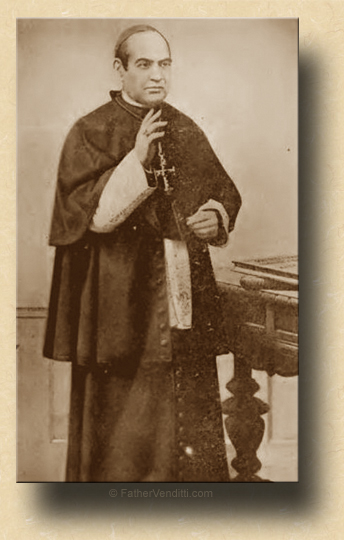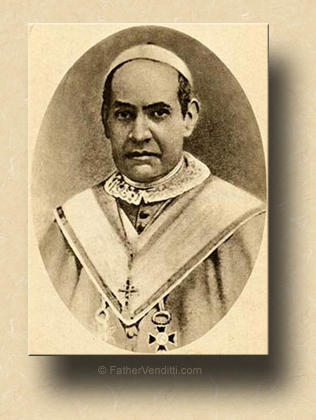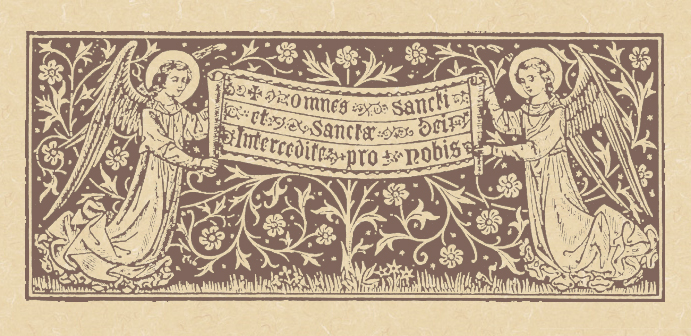The Patron Saint of Messing Things Up.
The Twenty-Ninth Thursday of Ordinary Time; or, the Memorial of Saint Anthony Mary Claret, Bishop.
Lessons from the primary feria, according to the ordinary form of the Roman Rite:
• Romans 6: 19-23.
• Psalm 1: 1-4, 6.
• Luke 12: 49-53.
|
If a Mass for the memorial is taken, lessons from the feria as above, or from the proper:
• Isaiah 52: 7-10.
• Psalm 96: 1-3, 7-8, 10.
• Mark 1: 14-20.
…or, any lessons from the common of Pastors for Missionaries or for a Bishop.
|
The Third Class Feast of Saint Raphael, Archangel.
Lessons from the proper, according to the extraordinary form of the Roman Rite:
• Tobit 12: 7-15.
• [Gradual] Tobit 8: 3.
• John 5: 1-15.
FatherVenditti.com
|
 10:47 AM 10/24/2019 — One of the reasons we often think we can’t be saints is we make the mistake of thinking that the saints were perfect people, and we know we’re not perfect. We have this impression because so many accounts of the lives of the saints give the impression that their lives were one continual procession of holiness from birth to the grave, ignoring the fact that the unattractive episodes of their lives can sometimes be more inspiring than the official versions found in our missals and prayer books. 10:47 AM 10/24/2019 — One of the reasons we often think we can’t be saints is we make the mistake of thinking that the saints were perfect people, and we know we’re not perfect. We have this impression because so many accounts of the lives of the saints give the impression that their lives were one continual procession of holiness from birth to the grave, ignoring the fact that the unattractive episodes of their lives can sometimes be more inspiring than the official versions found in our missals and prayer books.
Perhaps the most dramatic example of this is manifest in today's saint, Anthony Mary Claret. Born in Spain, he practiced the weaver's trade as a young man before becoming a priest. He served briefly as a parish priest before going to Rome to work for the Congregation for the Propagation of the Faith, hoping to be sent to the foreign missions; but, they instead sent him back to Spain, where he worked in the home missions, laboring mostly in Catalonia and the Canary Islands.
It was while there that he was appointed Archbishop of Santiago, Cuba (which was a colony of Spain at the time), but this is where the official biography of him suffers its own Nixonian missing eighteen minutes: it talks about the many wonderful spiritual books he wrote, his establishment of a couple of religious communities dedicated to spreading devotion to the Blessed Eucharist and the education of girls, and his efforts to educate and reform his clergy, but mentions nothing of the fact that his administration of the diocese was a complete and total disaster. He so mismanaged the financial affairs of the Archdiocese that, faced with a revolt of his clergy, the Holy See removed him from that post and arranged for him to become the personal confessor to the Queen of Spain, essentially putting him out to pasture with no pastoral responsibilities, where he could do no further damage to any diocese. It was while he was in Madrid in this nothing job that he became known for his holiness and his austerity of life. While there he also was responsible for spreading great devotion to the Blessed Sacrament and the Holy Rosary. As a bishop, he was entitled to attend the First Vatican Council, and vigorously defended the infallibility of the Pope; but, even these things didn't prevent him from making a mess of his seemingly harmless assignment as confessor to the Queen; having put his foot into his mouth one too many times, he got himself exiled from Spain, and died in France in disgrace in the year 1870. Pope Pius XI, who knew a saint when he saw one, beatified him, and he was canonized by Pius XII.
Anthony Mary Caret represents the kind of person we all know, who can't help, through no fault of his own, to ruin everything he touches. We know he wasn't the first saint like this, but it's clear that he isn't going to be the last, either:  Pope Francis canonized Pope Paul VI, and in his decree of canonization mentions nothing at all of the complete chaos in which he left the Church at the time of his death. We're told that the cause of Archbishop Sheen is progressing, but no one is talking about the fact that, during his brief time as Bishop of Rochester, New York, he also had so mismanaged the temporal affairs of his diocese that the Holy See pressured him to resign after only a few years. Pope Francis canonized Pope Paul VI, and in his decree of canonization mentions nothing at all of the complete chaos in which he left the Church at the time of his death. We're told that the cause of Archbishop Sheen is progressing, but no one is talking about the fact that, during his brief time as Bishop of Rochester, New York, he also had so mismanaged the temporal affairs of his diocese that the Holy See pressured him to resign after only a few years.
I understand why, for the sake of the simple-minded, the Church likes to whitewash the lives of the saints, but I challenge the wisdom of it for a couple of reasons: first, it gives the impression that, to be a saint, someone has to be perfect in every way, and that's not true by a long shot; but also because, by giving that impression, it derails us from seeking holiness since we are so conscious of not being perfect ourselves. In the Holy Gospel, Jesus calls us all to be saints, but every time we go to examine our consciences in preparation for confession we become acutely aware of how thoroughly we can mess things up. And this is why I think the Church does us a disservice when it gives us sanitized and histrionic lives of the saints, because sometimes the most inspiring thing about them was how imperfect they were, and the important lesson that holiness is not the same thing as competence. I also think we miss an opportunity, in those times in our lives, when we know we've made a mess of things, to seek the intercession of some very holy men and women who knew exactly what it means to mess things up.

|

